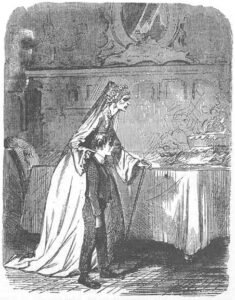‘It is a poor conclusion, is it not?” [Heathcliff] observed, having brooded a while on the scene he had just witnessed: “an absurd termination to my violent exertions? I get levers and mattocks to demolish the two houses, and train myself to be capable of working like Hercules, and when everything is ready and in my power, I find the will to lift a slate off either roof has vanished! My old enemies have not beaten me; now would be the precise time to revenge myself on their representatives: I could do it; and none could hinder me. But where is the use? I don’t care for striking: I can’t take the trouble to raise my hand! … I have lost the faculty of enjoying their destruction…
“Five minutes ago Hareton seemed a personification of my youth, not a human being; I felt to him in such a variety of ways, that it would have been impossible to have accosted him rationally. In the first place, his startling likeness to Catherine connected him fearfully with her. That, however, which you may suppose the most potent to arrest my imagination, is actually the least: for what is not connected with her to me? and what does not recall her? I cannot look down to this floor, but her features are shaped in the flags! In every cloud, in every tree—filling the air at night, and caught by glimpses in every object by day—I am surrounded with her image! The most ordinary faces of men and women—my own features—mock me with a resemblance. The entire world is a dreadful collection of memoranda that she did exist, and that I have lost her! Well, Hareton’s aspect was the ghost of my immortal love; of my wild endeavours to hold my right; my degradation, my pride, my happiness, and my anguish—
-Wuthering Heights, by Emily Bronte, pg. 236
In Wuthering Heights, the characters seem defined by their capacity for hate and cruelty. The novel features a nonstop barrage of abuse and death of one generation, and then starting the same with the next. But yet, from one perspective, the book ends relatively happily for the surviving characters. Catherine Linton and Hareton overcome their differences and abuse, Ellen sees her two surrogate children reunite, and Lockwood ultimately stays far, far away from the troubles up north. Finally, Heathcliff, the sole remaining member of the older generation, finally dies. As discussed in class, the ending seems very abrupt, one that Heathcliff even seems to acknowledge above. However, arguably, Heathcliff’s monologue after seeing Catherine Linton and Hareton together represents the culmination of the novel’s themes, and in some ways the true endpoint of the novel.
As Alexandra Lewis’ “Memory Possessed: Trauma and Pathologies” explains, “[Wuthering Heights questions] the way external traumas quickly become incorporated into the mind, lodging thorn- like beyond the grasp of conscious control.” (Lewis 417). In this quote, however, Heathcliff finally admits his “loss.” On one level, this refers to his loss of Catherine Earnshaw. Objects, people, and everything in nature are “memoranda” of Catherine’s loss. Hareton is naught but a shadow of Heathcliff’s past with Catherine, Hindley, and Heathcliff himself. Living people do not exist anymore- only as memories. Effectively, Heathcliff lives in a world of stasis and death. In this paragraph, Heathcliff admits the truth that has been shaping his actions.
Yet, it also serves as a reminder that Heathcliff has lost his plot of revenge. Using “mattocks,” “demolish,” and “levers” all have associations with machinery. Implicitly, this reminds the reader that Heathcliff has had to be incredibly patient and methodical to effectively kidnap all of the new “representatives” to enact revenge upon, like a machine. Yet, this machinery also reflects a lack of life. Life no longer exists since his first “loss”, and remaining life serves as a game against his “old enemies.” However, his enemies are long dead. Only phantasms remain to actually “play” against. Only a man living in this ghost world would continue to believe this long game has any meaning. Incidentally, the final argument between Catherine Linton and Heathcliff comes from her desire to plant flowers- something new and beautiful (Bronte 232). From this argument springs forth Heathcliff’s monologue. The words in his initial realization all speak to loss of ability, though phrases like “I can’t take the trouble…,” “I have lost…,” and “I don’t care…” (Bronte 236). If Catherine and Hareton together want to create something new outside of all the tragedies that has surrounded their lives, than Heathcliff has lost. When considering Lewis’ article on the effects of trauma, the destruction Heathcliff speaks of can refer to spiritual as well as physical, as he has been so “destroyed” that he essentially cannot function as a living person. But when Catherine and Hareton find a way to heal and live despite the dead’s influence, Heathcliff is finally undone.
Works Cited:
Bronte, Emily. Wuthering Heights. 1847. Wordsworth Editions Limited, 1992.
Lewis, Alexandra. “Memory Possessed: Trauma and Pathologies of Remembrance in Emly Bronte’s Wuthering Heights.” Pp. 406-423.
